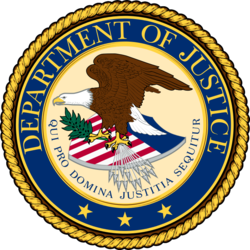US/DOJ
 | |
| Motto | Qui Pro Domina Justitia Sequitur |
| Formation | July 1, 1870 |
| Headquarters | Robert F. Kennedy Department of Justice Building |
| Type | |
| Subgroups | • United States Marshals Service • Federal Bureau of Investigation • Federal Bureau of Prisons • National Institute of Corrections • Bureau of Alcohol Tobacco Firearms and Explosives • Drug Enforcement Administration • Office of the Inspector General |
| Interest of | Ty Clevenger |
| Subpage | •US/DOJ/Corruption |
| As a former associate editor of the Wall Street Journal summarised "Justice is something that exists outside the borders of the United States. Never expect to find justice within the United States." | |
In an essay about 9-11, Paul Craig Roberts wrote "Justice is something that exists outside the borders of the United States. Never expect to find justice within the United States."[1] Mark Gorton includes the "criminalization of the Justice Department" in his summary list of the crimes of the cabal.[2] Some recent court decisions may elucidate the status quo about which they were passing such damning judgment:
Contents
Illustrative legal cases
In 2014, the US Supreme Court ruled that for-profit corporations such as Hobby Lobby should be considered "persons" under a law intended to protect religious liberties. By contrast, the government has claimed this week that detainees in Guantanamo Bay should not be considered "persons" under the same law.[3]
Saleh v. Bush
- Full article: War crime
- Full article: War crime
Sundus Shaker Saleh, an Iraqi single mother and refugee living in Jordan filed a complaint in March 2013 against George W. Bush, Richard Cheney, Donald Rumsfeld, Colin Powell, Condoleezza Rice and Paul Wolfowitz, arguing that they lied to the US public to deceitfully initiate a war of agression against Iraq. The United States Department of Justice brought 2 motions to dismiss the suit, claiming that since the defendants were acting within their scope of employment when planning and waging the Iraq War, they can not be held individually accountable for the harm caused. The case is currently in an unexplained legal limbo, since the hearing was cancelled sine die without explanation.[4]
Clapper v. Amnesty International USA
- Full article: Clapper v. Amnesty International USA
- Full article: Clapper v. Amnesty International USA
The US Supreme Court ruled, 5-4, that the case should be dismissed because the plaintiffs didn't have "standing" because the ACLU couldn't prove with near-certainty that their clients, including journalists and human rights advocates, were targets of surveillance. The court relied on two claims by the Justice Department
- That the NSA would only get the content of Americans' communications without a warrant when they are targeting a foreigner abroad for surveillance,
- That the Justice Department would notify criminal defendants who have been spied on under the Fisa Amendments Act
Both of these points are manifestly untrue after leaks by Edward Snowden prove that mass surveillance is targeting almost everyone, and no one is being notified of the fact. These manifest untruths notwithstanding, the ruling remains, more or less establishing a de facto precedent that anything done in secret is lawful.[5]
Hedges v. Obama
- Full article: Hedges v. Obama
- Full article: Hedges v. Obama
Chris Hedges and a group of other journsalists argued that the 2012 NDAA was unconstitutional. The act gave permission to the U.S. government to indefinitely detain people "who are part of or substantially support Al Qaeda, the Taliban or associated forces engaged in hostilities against the United States". On July 17, 2013, the Second Circuit Court of Appeals, citing Clapper v. Amnesty International USA, ruled that the plaintiffs lacked legal 'standing' to challenge the law[6][7][8] because it “simply says nothing about the government’s authority to detain citizens.”[6] The court held that under their interpretation the government could not use the particular law challenged by the citizen plaintiffs to militarily detain them, so they had no basis for the court to hear their case.
An event carried out
| Event | Description |
|---|---|
| Palmer Raids | A series of raids in 1919-1920 to capture and arrest foreign-born leftists and deport them from the United States. Breakthrough for J. Edgar Hoover. |
A Document by US/DOJ
| Title | Document type | Publication date | Subject(s) | Description |
|---|---|---|---|---|
| File:USDOJ - Eyewitness Evidence - A Guide For Law Enforcement.pdf | guidebook | October 1999 | Witness Evidence Standard opatering procedure | DOJ Guidelines on Eye Witness testimony |
Related Document
| Title | Type | Publication date | Author(s) | Description |
|---|---|---|---|---|
| Document:The Happiest of Days | blog post | 25 June 2024 | Craig Murray | Craig Murray: "I should be plain I have always advised Julian and Stella to take a plea deal if offered and get out of jail. I have no doubt this was a life or death choice." |
Rating
Although it barely scratches the surface, this article gives a useful set of pointers to information to help the reader understand what the modern US DOJ is.
References
- ↑ http://www.paulcraigroberts.org/2014/09/10/911-13-years-paul-craig-roberts/
- ↑ The Political Dominance of The Cabal, by Mark Gorton
- ↑ http://www.huffingtonpost.com/2014/07/09/hobby-lobby-guantanamo_n_5571510.html
- ↑ http://www.indybay.org/newsitems/2014/03/18/18752775.php
- ↑ http://www.theguardian.com/commentisfree/2014/may/17/government-lies-nsa-justice-department-supreme-court
- ↑ a b
{{URL|example.com|optional display text}} - ↑
{{URL|example.com|optional display text}} - ↑
{{URL|example.com|optional display text}}